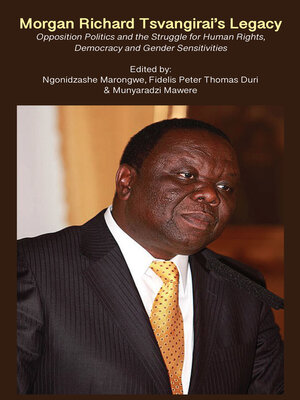Marongwe
ebook ∣ Morgan Richard Tsvangirai's Legacy: Opposition Politics and the Struggle for Human Rights, Democracy and Gender Sensitivities
By Ngonidzashe Marongwe

Sign up to save your library
With an OverDrive account, you can save your favorite libraries for at-a-glance information about availability. Find out more about OverDrive accounts.
Find this title in Libby, the library reading app by OverDrive.



Search for a digital library with this title
Title found at these libraries:
| Library Name | Distance |
|---|---|
| Loading... |
Morgan Richard Tsvangirai is arguably the most polarising figure and advocate of democracy and human rights in the history of opposition politics in Zimbabwe. He is as much a topic of debate in Zimbabwe and beyond as the late president Robert Gabriel Mugabe. Tsvangirai's legacy, like Mugabe's, remains indisputably controversial and conflicted. Broadly, the divided opinion on the Tsvangirai legacy can be represented, firstly, by those who argue that Tsvangirai was the champion of democracy and the face of the struggle for human rights in Zimbabwe. In this light, Tsvangirai has been variously described as a "selfless...people's hero", a "colossus of the struggle for democracy", "the commander of the struggle", "a symbol of courage and resistance", and "the doyen of constitutionalism" in Zimbabwe. On the other hand, critics have described Tsvangirai as a "sell-out", "a Judas Iscariot", "traitor", and "coward", among other nefarious and pejorative characterisations. Drawing on all these opinions and the various characterisations of Tsvangirai, this book provides a comprehensive and multi-disciplinary appraisal of a gigantic trade unionist and political figure who, in his life and in death, inspires different narratives, emotions and values. This book is therefore about a mortal but "living" figure who left an indelible mark on Zimbabwe, Africa and the rest of the world in fields such as trade unionism, governance and politics. As such, the book is handy for students and practitioners in African studies, political science, policy studies, economics, history, global studies and development studies.







